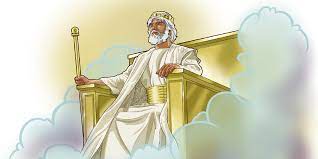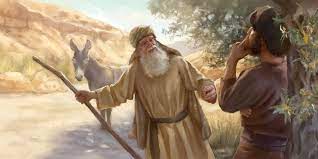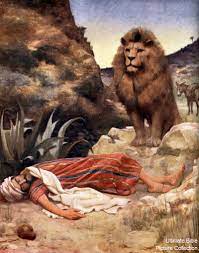A Tale of Two Prophets
First Kings 13: 1-34
A tale of two prophets DIG: What warnings came from God to Jeroboam? How did Jeroboam respond to those warnings? Because the prophet was deceived and then disobeyed, he was punished. What message should this have been to King Jeroboam? To believers today?
REFLECT: Are you being tempted in any way right now to step off the straight and narrow path? What’s the remedy? How would you respond if someone told you they had a word from God for you to do something? How would you know whether to do what that person said?
God’s Word will come true no matter what the circumstances.
This long chapter is not about young and old prophets; it’s about King Jeroboam and his sins. The young prophet’s ministry here is very important in this account, for all that he said and experienced, including his death, were a part of God’s warning to King Jeroboam. According to First Kings 13:33, Jeroboam did not turn back from his evil way. In this chapter, a prophet died, but in the next chapter, the crown prince died (to see link click Dg – The Prophecy of Ahijah)! Obviously, Ha’Shem was trying to get Jeroboam’s attention. Jeroboam made two serious mistakes during his twenty-two-year reign. One, he didn’t believe in God’s promises (see Dd – Golden Calves at Dan and Bethel), and two, he didn’t heed God’s warnings.

The message: An anonymous prophet came from Judah since there were still faithful servants of God there whom YHVH could use. He met Jeroboam at the shrine at Bethel, which eventually became the king’s sanctuary, a royal temple (Amos 7:13). When you make up your own religion, as Jeroboam did, you can do whatever you please, and Jeroboam chose to be a priest and a king. Jeremiah and Ezeki’el were priests who were called to be prophets, but the Torah didn’t permit kings to serve as priests (Second Chronicles 26:16-23). Yeshua Messiah is the only King who is also a Priest (Hebrews Chapters 7 and 8). And all who believe in Messiah are kings and priests (Revelation 1:6) and a royal priesthood (First Peter 2:9). Jeroboam’s priesthood was counterfeit, and therefore rejected by ADONAI. That may be why the anonymous prophet from Judah delivered his message while the king was standing at the altar to burn incense.
But the prophet spoke to the altar, not to the king, as though God no longer wanted to address Jeroboam, a man so full of himself and plans that he had no time to listen to the LORD. The message declared that the future lay with the house of David, not with the house of Jeroboam. Because of Jeroboam’s evil ways, the kingdom would become so polluted with idolatry that it would be wiped out within two centuries. In 722 BC the Assyrians captured Isra’el and all those who were unfaithful to ADONAI walked off the pages of the Bible. David’s dynasty continued in the South until the reign of Zedekiah (597-596 BC). He was Judah’s last king before the Babylonian conquest of Jerusalem in 586 BC.
The prophet’s looked ahead three hundred years to the reign of godly King Josiah (see the commentary on Jeremiah Ai – Josiah Ruled For 31 Years from 640 to 609 BC), who rooted out the idolatry in the Land, including the king’s shrine at Bethel (Second Kings 23:15-16). The man of God cried out against the altar: “Altar, altar, here is what ADONAI says: A son will be born to the house of David; his name will be Josiah; and on you he will sacrifice the priests of the high places who burn incense on you! Josiah desecrated Jeroboam’s altar by burning human bones on it, and then he tore down the altar and let the ashes spill out on the ground. They will burn human bones on you, which would desecrate it permanently and make it unfit for any further religious use of any kind! That same day he also gave a sign, saying, Here is the sign which ADONAI has decreed, “The altar will be split apart; the ashes of the sacrifices, saturated with fat which were the deities portion of the sacrifice, on it will be scattered about on the ground, another desecration” (First Kings 13:1-3). In this case, a desecration by God Himself. The prophecy was fulfilled just as the prophet had spoken. So sure was his promise that the man of God even named the exact king!340
The miracles: The king paid no attention to the message from God; all he wanted to do was punish the messenger. He was enraged to hear that a king from Judah would one day desecrate and destroy his self-proclaimed religious system. When the king heard what the man of God said, how he denounced the altar in Bethel, Jeroboam took his hand away from the altar and said, “Seize him!” But his hand, the one he had stretched out against him, shriveled up; so that he could not draw it back to himself. What a humiliating experience for such a powerful king and priest! Also at that moment the altar was split apart, and the ashes scattered from the altar on the ground, according to the sign which the man of God had given by the word of ADONAI. YHVH often authenticates His Word by miracles (Hebrews 2:1-4), but only to give emphasis to the message. In spite of Jeroboam’s stubborn pride and willful disobedience, God graciously healed his hand. The king then responded to the man of God. “Ask now the favor of ADONAI your God,” he said, “and pray for me, that my hand will be restored to me.” The man of God prayed to ADONAI, and the king’s hand was restored to him and became as it had been before. Too bad the king was more concerned about physical healing for his body than moral and spiritual healing for his soul (First Kings 13:4-6).341
The maneuver: Jeroboam was a clever man and tried to trap the prophet by inviting him to the palace for a meal. The Adversary comes as a roaring lion to devour us (First Peter 5:8), and then if that fails, he comes as a serpent to deceive us (2 Corinthians 11:3; Genesis 3:1ff). The king then said to the man of God, “Come home with me, and refresh yourself, and I will give you a reward. But the man of God replied to the king, “Even if you give me half your household, I will not accept your hospitality; nor will I eat food or drink water in this place. For this is the order I received through the word of ADONAI, ‘Don’t eat food or drink water, and don’t return by the road you took when you came.’ ” Had the prophet eaten a meal with the king, that one simple act would have wiped out the effectiveness of his witness and ministry. In the east, sharing a meal is a sign of friendship and endorsement. So he went another way and did not return by the road by which he had come to Bethel (1 Kings 13:7-10). Up to this point the man of God has been obedient to ADONAI.342

The mistake: Now there lived an old prophet in Bethel. He was like Balaam, he had the true prophetic gift, but was given over to worldly self-promotion. And one of his sons came and told him all the things the man of God had done that day in Bethel; also they told their father what he had said to the king because he had witnessed the confrontation. The plural indicates that when the first son spoke the other son joined in, confirming what his brother had said. Their father asked them, “Which way did he go?” For his sons had seen what road the man of God from Judah had taken. He then said to his sons, “Saddle the donkey for me.” So they saddled the donkey for him; and, riding on it, he went after the man of God.
He found him sitting under an oak tree and said to him, “Are you the man of God who came from Judah?” He answered, “I am.” Then he said to him, “Come home with me and eat some food.” He replied, “I cannot return with you or partake of your hospitality, nor will I eat food or drink water with you in this place; because it was said to me by the word of ADONAI, ‘You are not to eat food or drink water there, and you are not to go back by the way you came.’ ” The other prophet lied to him, saying: I too am a prophet, just like you; and an angel spoke to me by the word of ADONAI and said, “Bring him back with you to your house, so that he can eat food and drink water.” But he was lying to him. So he went back with him and did eat food and drink water in his house (First Kings 13:11-20). The man of God knew what ADONAI had said to him and should have obeyed until he heard from God Himself. This is a good principle for us today.
Dear Heavenly Father, Praise You that You are always there to answer my prayers. You are Sovereign over the whole world, yet You graciously have time to listen to me. You are always right there with me for You have made your home within me (John 14:23). Thank You that when I ask You for wisdom, You never put me off and say You are busy; instead, You graciously give me wisdom and help. But if any of you lacks wisdom, let him ask of God, who gives to all without hesitation and without reproach; and it will be given to him (James 1:5).
Thank You that I don’t have to wait till heaven to talk to You and to bless You. I can pray praises and requests to You any time of the day and You are always there to listen. Now this is the confidence we have before Him – that if we ask anything according to His will, He hears us. And if we know that He hears us – whatever we ask – we know that we have the requests we have asked from Him (First John 5:14-15). It is a joy to live pleasing to You. Thank You for being such a wonderful and loving Father. Please help me to remember to trust Your Word, praying for Your wisdom in the situation. I love You! In Yeshua’s holy Name and power of His resurrection! Amen
Since he knew what the prophet from Judah was supposed to do, why did the old man deliberately lie to the young man and encourage him to disobey the LORD? Was the old man worried that the visiting prophet might stir things up in a comfortable Bethel and create problems for him and the other satisfied compromisers? Perhaps the younger prophet was feeling proud of what he had done – preaching a powerful message and performing three miracles – and God used the old man to test him and bring him back to reality. By telling a lie, the old prophet tempted the young man, but the young prophet fell right into his trap by believing him. Why didn’t the young visitor seek the face of YHVH and find out His will? The text tells us only the events, not the motives in the hearts of the participants, so we can’t be dogmatic about these questions.

As they were sitting at the table, the word of ADONAI came to the prophet who had brought him back; and he cried to the man of God who had come from Judah, “Here is what ADONAI says: Since you rebelled against the word of ADONAI and didn’t obey the mitzvah ADONAI your God gave you, but came back and ate food and drank water in the place where he warned you not to eat food or drink water, your corpse will not arrive at the tomb of your ancestors.” After he had eaten food and drunk, he saddled the donkey for the prophet he had brought back. But after he had gone, a lion encountered the man of God on the road and killed him. His corpse lay there in the road, with the donkey and the lion standing next to it. In time, people passed by and saw the corpse lying in the road with the lion standing next to it; and they came and told about it in the city where the old false prophet lived (First Kings 13:21-25).
When the prophet who had brought him back from the road heard about it, he said: It is the man of God who rebelled against the word of ADONAI; this is why ADONAI handed him over to the lion to tear him to pieces and kill him, in keeping with the word ADONAI spoke to him.” To his sons he said, “Saddle the donkey for me,” and they saddled it. He went and found his corpse lying in the road, with the donkey and the lion standing next to the corpse; the lion had neither eaten the corpse nor attacked the donkey, a very unusual sight, showing God’s hand. The prophet picked up the corpse of the man of God, laid it on the donkey and brought it back to the city where he lived, to mourn and bury him. He laid the corpse in his own burial cave, and thus the prophecy was fulfilled because he was not buried in the cave of his fathers. And they mourned him – “Oh! My brother!” Now the family tomb of the lying prophet and the man of God was still known three centuries later (Second Kings 23:17). The old prophet knew the young prophet’s words would come true. So after burying him he said to his sons, “When I die, put me in the burial cave where the man of God is buried; lay my bones next to his bones. For the thing he cried by the word of ADONAI against the altar in Bethel and against all the temples on the high places near the cities of Samaria will surely happen” (First Kings 13:26-32). The old man was a mixture of curiosity, dishonesty, accuracy and conviction.
But did any of these unusual events convict the heart of King Jeroboam and bring him to a place of repentance? No. After this, after the death of the man of God, Jeroboam did not turn back from his evil way but continued appointing priests for the high places from among all the people; he consecrated anyone who wanted to be a priests of the high places. This brought sin to the house of Jeroboam that would eventually cut it off and destroy it from the face of the earth (First Kings 13:33-34).343



Leave A Comment